英语2011届高考复习课件:动词
图片预览
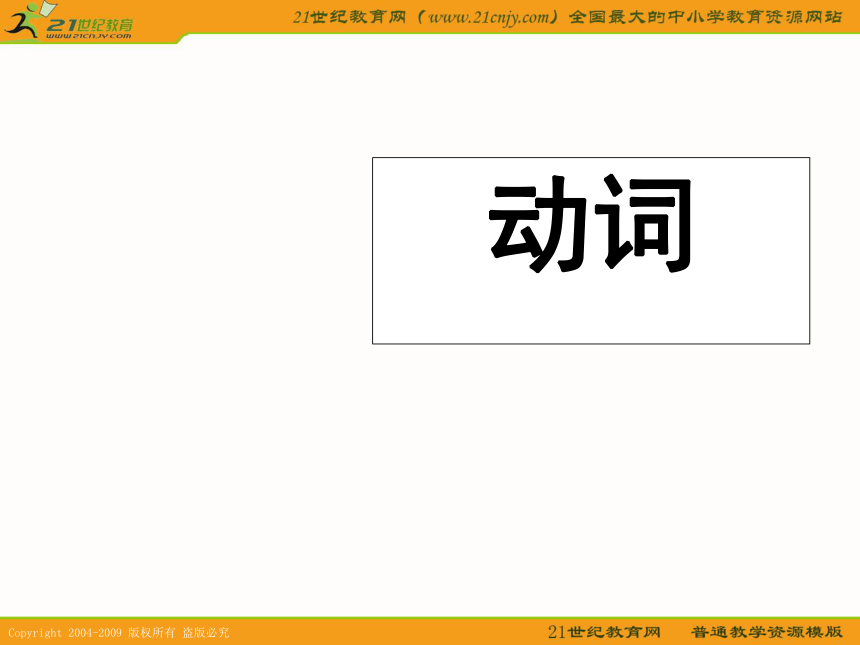
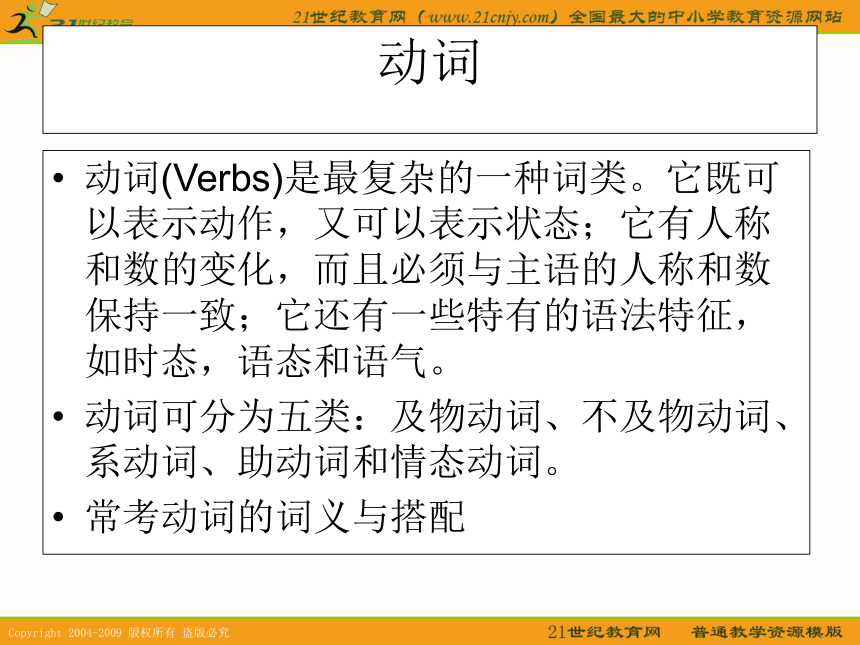
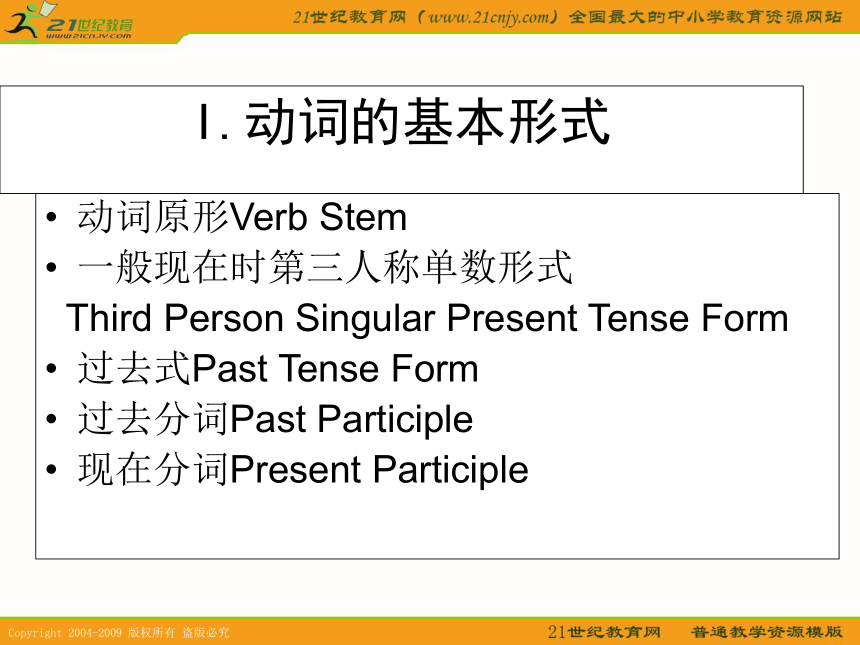
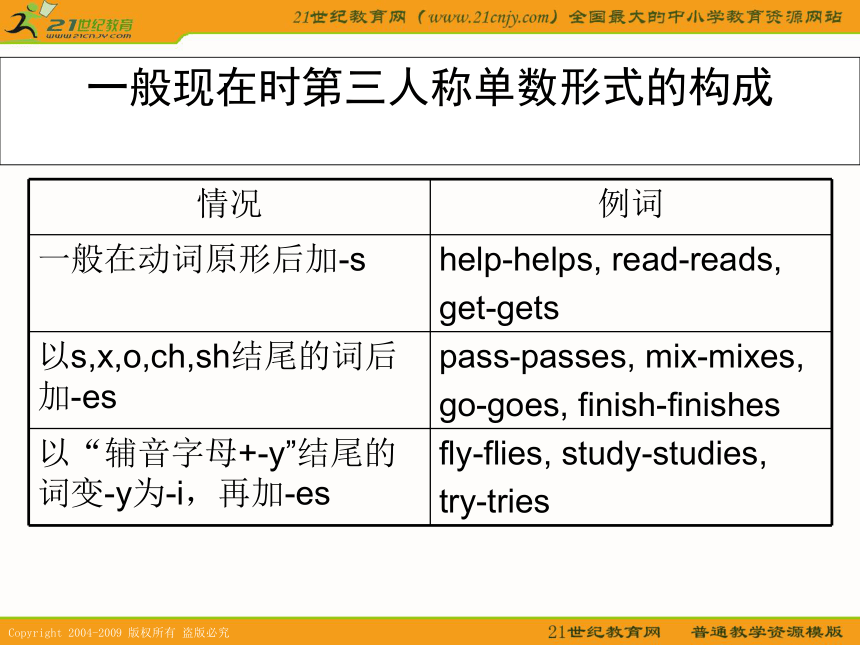
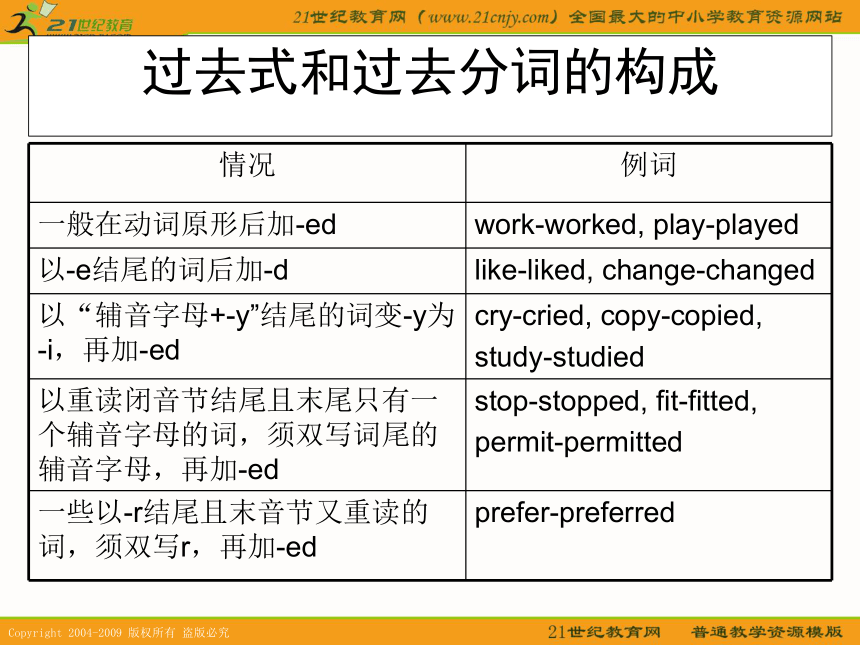
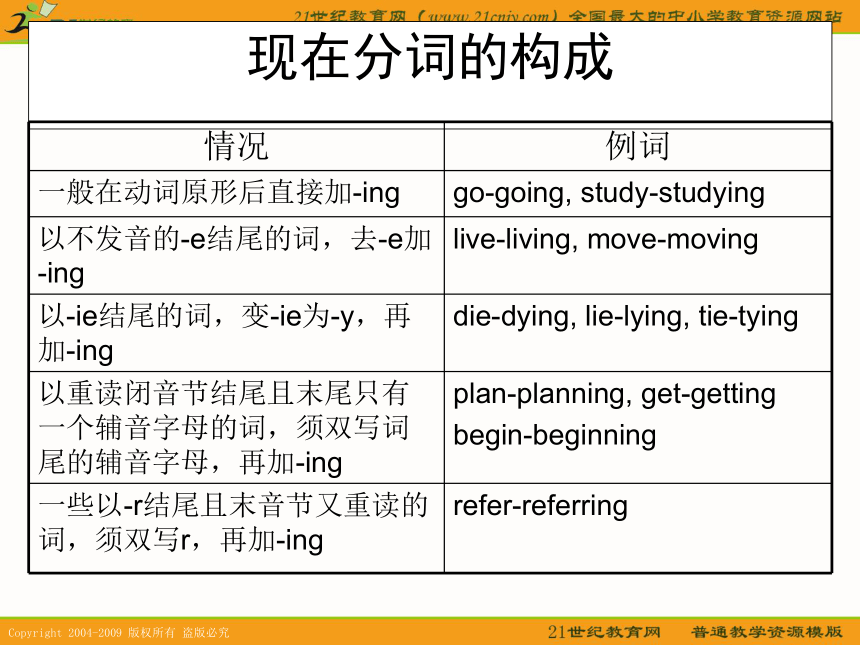
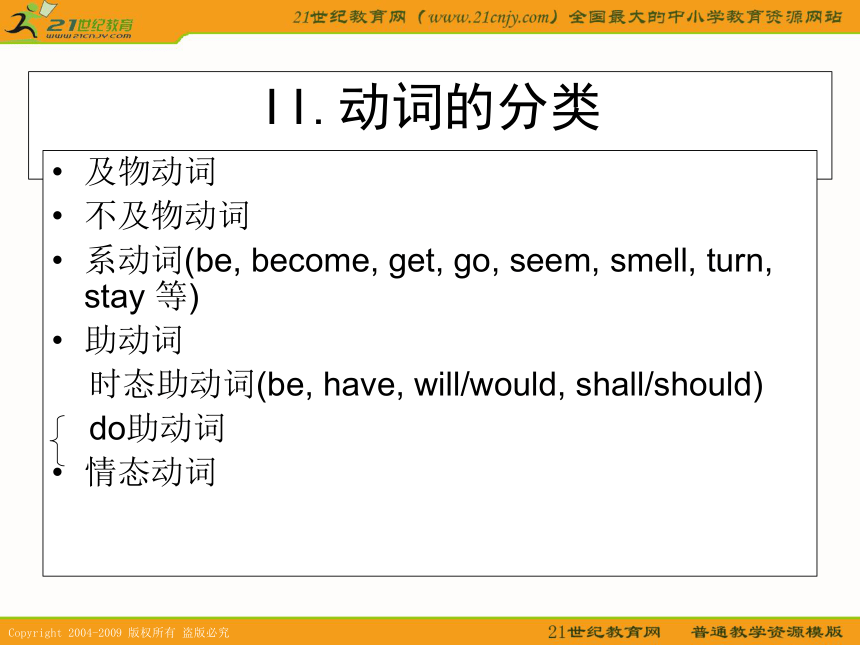
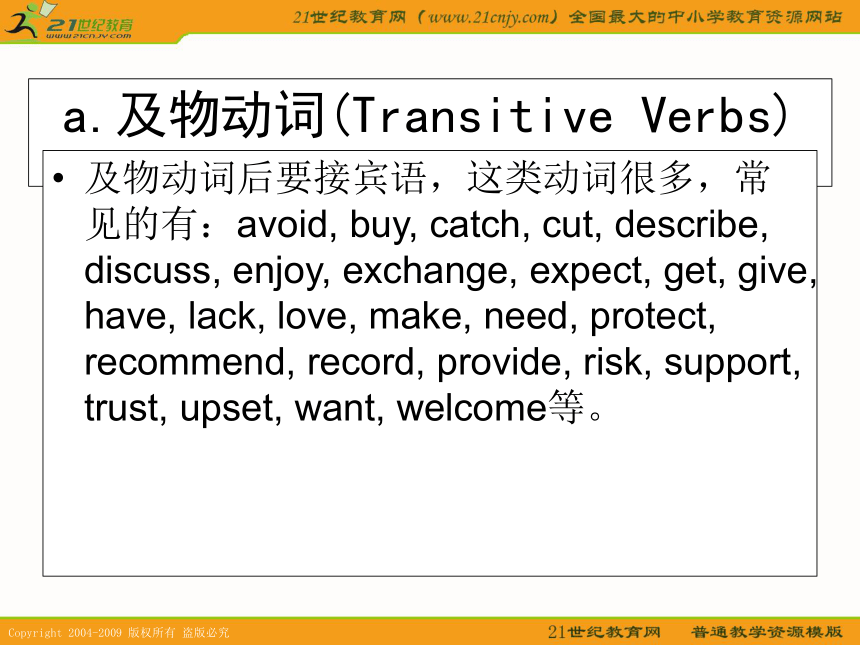
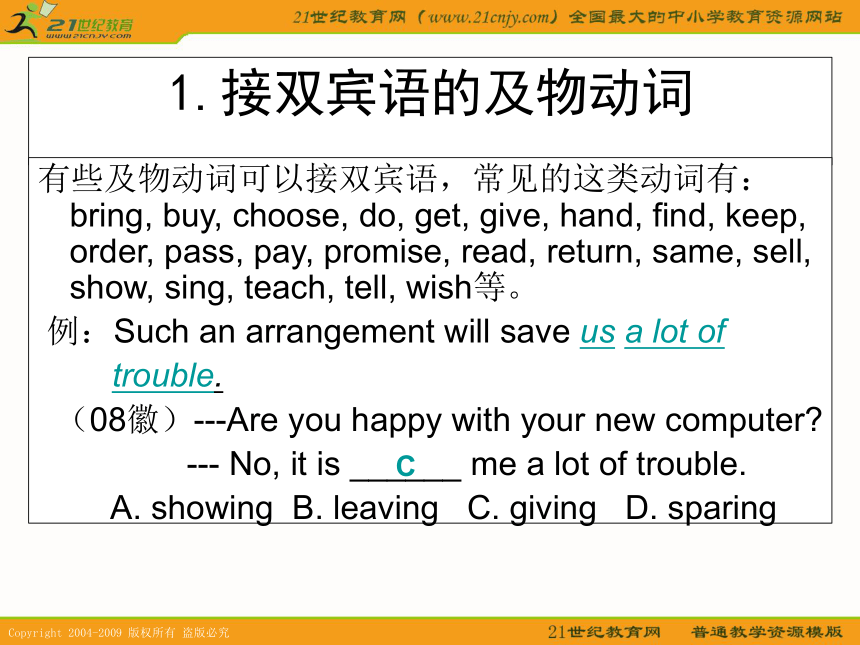
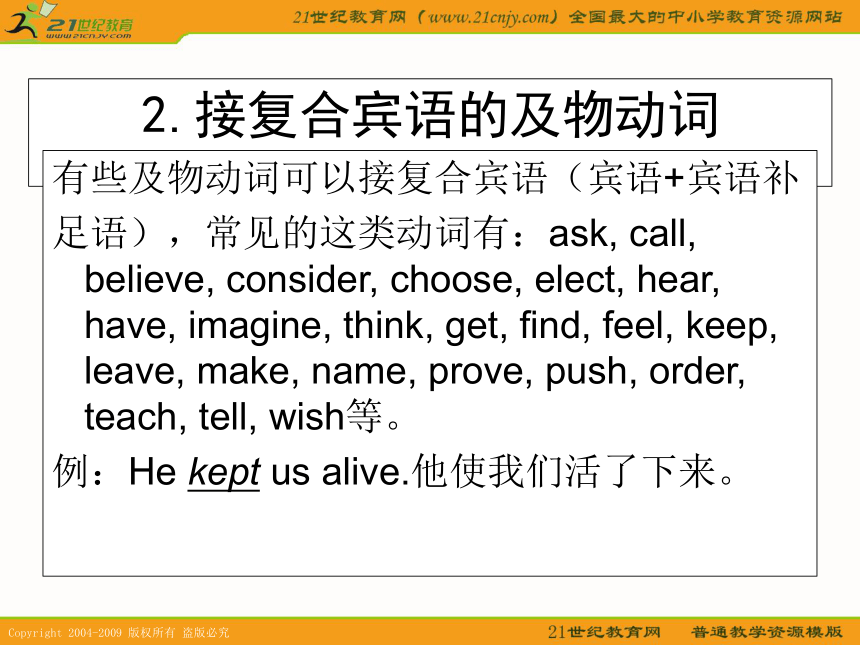
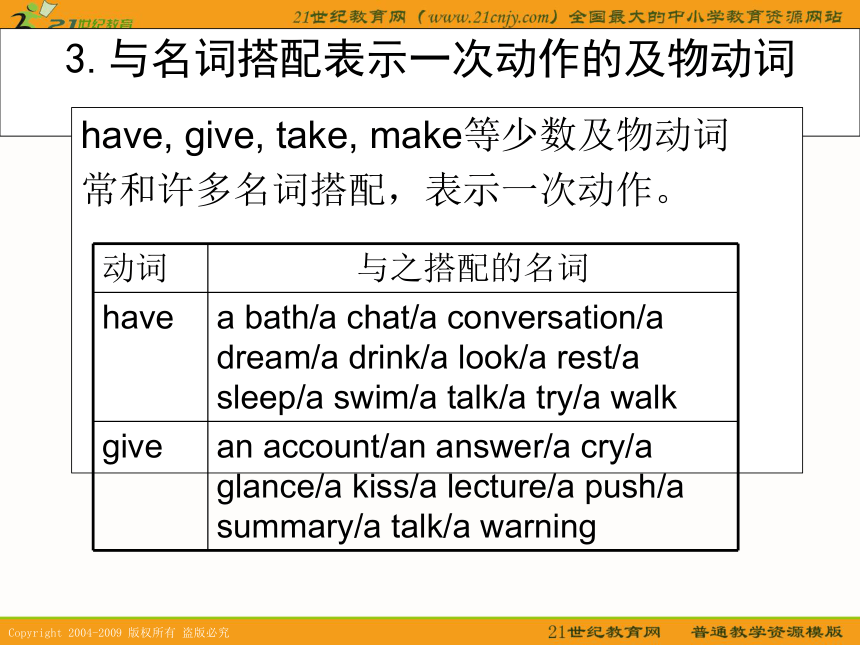
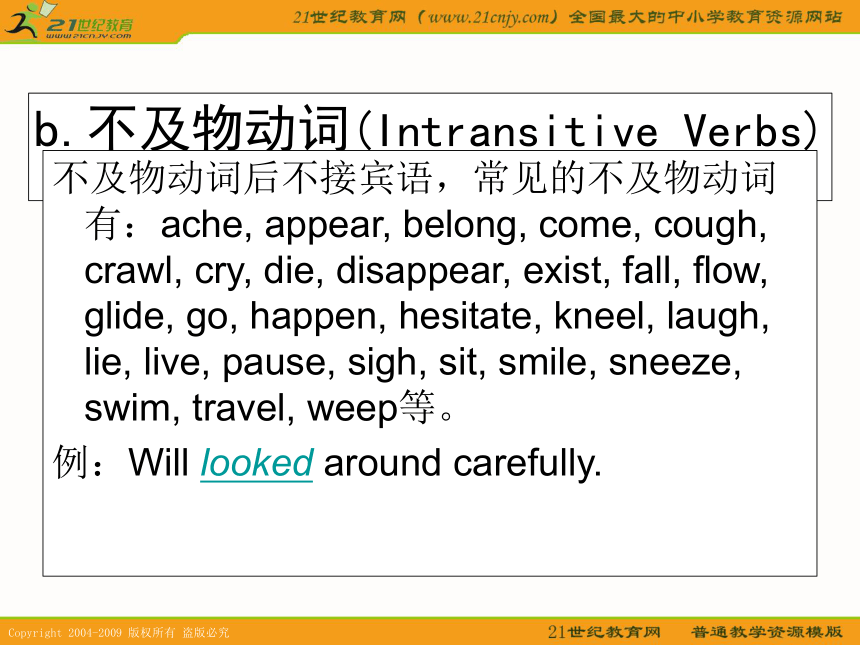
文档简介
课件44张PPT。动词动词动词(Verbs)是最复杂的一种词类。它既可以表示动作,又可以表示状态;它有人称和数的变化,而且必须与主语的人称和数保持一致;它还有一些特有的语法特征,如时态,语态和语气。
动词可分为五类:及物动词、不及物动词、系动词、助动词和情态动词。
常考动词的词义与搭配I.动词的基本形式动词原形Verb Stem
一般现在时第三人称单数形式
Third Person Singular Present Tense Form
过去式Past Tense Form
过去分词Past Participle
现在分词Present Participle一般现在时第三人称单数形式的构成过去式和过去分词的构成现在分词的构成II.动词的分类及物动词
不及物动词
系动词(be, become, get, go, seem, smell, turn, stay 等)
助动词
时态助动词(be, have, will/would, shall/should)
do助动词
情态动词
a.及物动词(Transitive Verbs)及物动词后要接宾语,这类动词很多,常见的有:avoid, buy, catch, cut, describe, discuss, enjoy, exchange, expect, get, give, have, lack, love, make, need, protect, recommend, record, provide, risk, support, trust, upset, want, welcome等。1.接双宾语的及物动词有些及物动词可以接双宾语,常见的这类动词有:bring, buy, choose, do, get, give, hand, find, keep, order, pass, pay, promise, read, return, same, sell, show, sing, teach, tell, wish等。
例:Such an arrangement will save us a lot of
trouble.
(08徽)---Are you happy with your new computer?
--- No, it is ______ me a lot of trouble.
A. showing B. leaving C. giving D. sparingC2.接复合宾语的及物动词有些及物动词可以接复合宾语(宾语+宾语补
足语),常见的这类动词有:ask, call, believe, consider, choose, elect, hear, have, imagine, think, get, find, feel, keep, leave, make, name, prove, push, order, teach, tell, wish等。
例:He kept us alive.他使我们活了下来。3.与名词搭配表示一次动作的及物动词have, give, take, make等少数及物动词
常和许多名词搭配,表示一次动作。
b.不及物动词(Intransitive Verbs)不及物动词后不接宾语,常见的不及物动词有:ache, appear, belong, come, cough, crawl, cry, die, disappear, exist, fall, flow, glide, go, happen, hesitate, kneel, laugh, lie, live, pause, sigh, sit, smile, sneeze, swim, travel, weep等。
例:Will looked around carefully.1.接同源宾语的不及物动词可接同源宾语的不及物动词有:live, laugh, smile,
sleep, die, dream等;同源宾语前往往有定语修饰。
例:I dreamed a strange dream last night.
Like Huck, Mark Twain lived an adventurous life.2.与介词搭配组成短语动词的不及物动词有些不及物动词可与介词搭配组成短语动词(Phrasal Verbs),相当于及物动词,其后接
宾语。
例:He kept on saying really mean things to
hurt me.
I listened to music before I could speak.Tips有些动词与介词或副词搭配构成短语动词,表达一个
概念,其作用相当于一个单独的动词。例:
arrive at=reach call on=visit come about=happen
care for=like go up=rise keep on=promise
make for=understand put off=postpone
ring up=telephone3.容易混淆的不及物动词 和及物动词lie与lay
Your book is lying on the desk.
I laid your book on the desk.
rise 与raise
The teacher’s voice rose.
The teacher raised his voice.
sit 与seat
Please sit down.
Please be seated.
Tips英语中有很多动词兼作及物动词和不及物动词。如meet, move, hurt, pass, run, remember, answer, write等。词义有的不变,有的会有所不同。例如:
She can write poems in English.
She writes very well.
Glad to meet you.
Where shall we meet?c.系动词(Linking Verbs)系动词与其后的表语一起才能表达一个完整的意义。
表语多用名词或形容词。常见的系动词有:appear, be, become, fall, get, go, grow, keep, look, prove, remain, seem, smell, sound, stay, taste, turn等。例如:
He often became very excited during these
readings.
My mouth fell open and I just looked at him.Tips英语的系表结构中,有一些固定搭配,如:
fall asleep/ill/sick;
go bad/blind/hungry/pale/red/tired/wrong;
grow angry/big/cold/calm/dark/fat/hot/loud/old/rich
/serious/thin/tall/worse;
keep calm/close/cool/fit/fine/quiet/silent/warmd.助动词动词根据其含义和语法功能可分为实义动词(Notional Verbs)和助动词(Auxiliary Verbs)。
实义动词意义完整,能够独立作谓语,而助动
词本身无词汇意义或意义不完整,不能单独作
谓语。试比较:
The boy does his homework every day.
The boy doesn’t do his homework on Sundays.助动词的分类 助动词常用来与实义动词一起构成各种时态、语态、语气、否定和疑问结构,以表达说话人的各种情态。助动词可分为时态助动词和do助动词两种。1.时态助动词时态助动词有be, have, will/would, shall/should可以
用来构成各种时态、语态和语气。例如:
We will go to Africa first.
The modern Olympic Games were held in 1896, in
Athens.
(04沪)The first use of Atomic weapons was in 1945, and their power____ increased enormously ever since.
A. is B. was C. has been D. had beenC2.do助动词do可帮助构成疑问句和否定句,还可表示强调
或代替前面动词以避免重复。例如:
Do you find homework tiring and boring?
As you can see, I did escape.
Walking and riding your bike count, and so do
school sports.III.常考动词的词义与搭配 have的各种句型及用法 1. have sth. done(注重“结果”)
2. have sb./sth. doing…
3. have sb. do …
4. have sb./sth. done/doing…/do…
make的各种句型及用法 make +宾语
make + 双宾语
make + 宾语+名词(补足语)
make + 宾语+形容词(补足语)
make + it+adj/noun+infinitive/that-clause
make sb./sth.+infinitive without “to”
make sth./oneself+past participle
consider的用法1. consider+宾语(名词、代词、从句、动名词或不定式的疑问式)
2. consider+宾语+补足语(名词、形容词、不定式to be/to have been)
3. consider it+名词或形容词+to do sth.
4. consider…(as)
类似说法:have A as B treat A as B
think of A as B speak of A as B
regard A as B look on/upon A as B
refer to A as B accept…as
look up to…as remember…as
count…as use A…B
三建议advise, persuade, suggest
三个看起来seem, look, appear
四打击beat, hit, strike, knock
四想要hope, wish, want, expect
五输赢win, defeat, beat, gain, fail
五收到receive, accept, admit, get, take
六穿put on, wear, have on, dress, be in,
pull on
七花费spend, cost, pay, take,
charge, buy, sell
IV.一些重点动词短语归纳break
bring
call
get
go
hold
make
put
turn
takebreak a. Anyone who breaks the law should be punished. break one’s word(promise)/the rules(regulations) /the appointment(违背)
b. The criminal tried to break away from the policeman.(摆脱)
c. Our car broke down and we had to tow it to a garage.(抛锚)
All our plans broke down. (计划、谈判等失败)
Her health broke down under the pressure of work.(身体垮掉)
Chemicals in the body break down our food into useful substance.(分解)
d. During our conversation, he often broke in with a
slight jest.(插嘴)
e. Thieves broke into our apartment last night.(闯入)
f. Our trading connection was broken off owing to a
disagreement over prices.(中断)
g. World War I broke out in 1914.(火灾、战争等爆发)
h. After midnight, the party broke up.(散开)
I. Our troops had little difficulty in breaking through
the lines of the police. (突破)bring a. The accident was brought about by the carelessness of the driver.(引起)
b. Good harvest will bring down the price.(降低价格)
c. It’s brave of him to bring forward objections at the meeting.(提出)
d. To promote the local economy, the government decided to bring in large amounts of advanced equipment.(引进)
e. He brings in 5,000 yuan every month.(赚得)
f. His mother died when he was young and his grandmother brought him up.(抚养)
g. He was so ill that he brought up everything.(呕吐)call a. The profession calls for the ability to improvise. (需要)
b. I will call for you at six tomorrow morning. (来接)
c. It’s time that you called for your packages. (来取)
d. He happened to be out when I called in his home. (拜访)
e. You should call in a doctor at once. (请来)
f. The army was called in to cut through fallen trees and to help clear the roads and paths. (召集)
g. The basketball match was called off because of
the rain. (取消)
h. He happened to be out when I called on him. (拜访)
i. The government called on the public to take
action to protect the environment. (号召)
get a. You are supposed to try your best to get your studies improved.(使得)
The lecture soon got us thinking.
I got him to clean the floor this time.
b. My work is getting along/on better now. (进展)
Tom is easy-going and gets along/on well with
everyone.(相处)
c. The teacher was unable to get his meaning across to theclass.(使……被理解)
d. The story has got round-everybody knows about it. (消息传开)
e. Don’t you think it’s time we got down to business?(开始认真做某事)
f. With my friends helping me get over the difficulties, I can finish the task in advance. (克服)
g. The operator finally got me through. (接通电话)
h. He has got through $1,000 in less than a year. (用完)
i. John has got through the examination.(通过)
j. I’ll be with you as soon as I get through this work. (做完)
k. get on/off the bus(上下汽车) get together(相聚)goa. But if you go against nature and do things at the wrong time of year, you will have to do more work and the results will not be so good. (违背)
b. --- How is everything going?
--- Things are going very well. (进展)
c. The black hair was going grey. (变得)
d. The engine went beautifully. (运转)
e. As the saying goes, “No pains, no gains.” (流传)
f. If you think you can solve the problem, go ahead. (开始做某事)
g. --- May I borrow your dictionary?
--- Yes, go ahead. (表同意)
h. Time went by quickly. (过去)
i. Shares have gone down again by ten points. (价格
下降)
j. She had no time to go deeply into the matter just
then. (调查)
k. What is going on out there? (发生)
l. Why not buy some English tapes and some books
to go with them? (相配)
m. When smokers who are used to nicotine go
without it for an hour or two, they begin to feel bad. (不吃,不用)
n. Go over your work before you hand it in. (仔细检查)
o. He doesn’t go in for team games. (对某事有兴趣,
爱好)holda. She held back, not knowing what to do or say. (犹豫不决)
b. Don’t hold anything back, you must tell me everything. (隐瞒)
c. If they hadn’t held him back, he would have beaten you. (阻碍)
d. I made my choice and I will hold on to the end. (坚持下去)
e. He asked me to hold on while he left the phone to find a pencil. (别挂电话)
f. Could he hold out in spite of the difficulty?
(坚持顶住压力)
g. The pupil held up his hand to ask the
teacher a question. (举起)
h. A lot of cars were held up in the accident.
(使停顿)
i. hold office(任职)
hold a post/position (担任某个职位)put a. John puts ten dollars aside every week. (存储)
b. He put aside his textbooks when he left school and never reopened. (放下)
c. Put aside all that has happened and try to start again. (搁在一边)
d. Put your books away. (收起来)
e. Put the dictionary back on the shelf. (放回原处)
f. The meeting has been put off until next week. (推迟)
g. He put out the lamp and went out. (使熄灭)
h. Put on more clothes or you’ll catch a cold. (穿戴)
i. Are you serious in putting forward such a view?
(提出)
j. put into effect(使实现)
put into force(使生效)
put into practice(实行)
put on weight(增加体重)
put one’s heart into(全心全意干某事)
put up with(忍受)
k. I just didn’t wish to put you to the trouble of
changing a large note. (给某人添麻烦) take a. The assistant did not take (对待)her seriously and advised her to buy two bottles of expensive wine.
b. I won’t take up much of your time. (占去时间、空间等)
c. When he left school he took up journalism. (从事)
d. People should be ready to go to prison for their beliefs, but they should never take up arms to fight. (拿起武器)
e. When you return to the office the following day, you can listen to the messages and take any necessary action. (采取行动)
f. Jean took advantage of the lunch hour to finish her homework. (利用)
g. I take back what I said. (收回)
h. Take it easy. The roads are icy. (不要着急)
i. He is taking over my job while I am on holiday.
(接管)
j. He seemed to take great pride in his work.
(对……感到骄傲)
k. I’ll take on the work, but I can’t tell you exactly
when I’ll finish it. (承担)
l. The Great Wall has taken on a new look since
the liberation. (呈现)
m. Is the supermarket taking on any more
assistants? (雇佣)
n. Be careful not to be taken in by the salesman.
(欺骗)
谢谢!再见!
动词可分为五类:及物动词、不及物动词、系动词、助动词和情态动词。
常考动词的词义与搭配I.动词的基本形式动词原形Verb Stem
一般现在时第三人称单数形式
Third Person Singular Present Tense Form
过去式Past Tense Form
过去分词Past Participle
现在分词Present Participle一般现在时第三人称单数形式的构成过去式和过去分词的构成现在分词的构成II.动词的分类及物动词
不及物动词
系动词(be, become, get, go, seem, smell, turn, stay 等)
助动词
时态助动词(be, have, will/would, shall/should)
do助动词
情态动词
a.及物动词(Transitive Verbs)及物动词后要接宾语,这类动词很多,常见的有:avoid, buy, catch, cut, describe, discuss, enjoy, exchange, expect, get, give, have, lack, love, make, need, protect, recommend, record, provide, risk, support, trust, upset, want, welcome等。1.接双宾语的及物动词有些及物动词可以接双宾语,常见的这类动词有:bring, buy, choose, do, get, give, hand, find, keep, order, pass, pay, promise, read, return, same, sell, show, sing, teach, tell, wish等。
例:Such an arrangement will save us a lot of
trouble.
(08徽)---Are you happy with your new computer?
--- No, it is ______ me a lot of trouble.
A. showing B. leaving C. giving D. sparingC2.接复合宾语的及物动词有些及物动词可以接复合宾语(宾语+宾语补
足语),常见的这类动词有:ask, call, believe, consider, choose, elect, hear, have, imagine, think, get, find, feel, keep, leave, make, name, prove, push, order, teach, tell, wish等。
例:He kept us alive.他使我们活了下来。3.与名词搭配表示一次动作的及物动词have, give, take, make等少数及物动词
常和许多名词搭配,表示一次动作。
b.不及物动词(Intransitive Verbs)不及物动词后不接宾语,常见的不及物动词有:ache, appear, belong, come, cough, crawl, cry, die, disappear, exist, fall, flow, glide, go, happen, hesitate, kneel, laugh, lie, live, pause, sigh, sit, smile, sneeze, swim, travel, weep等。
例:Will looked around carefully.1.接同源宾语的不及物动词可接同源宾语的不及物动词有:live, laugh, smile,
sleep, die, dream等;同源宾语前往往有定语修饰。
例:I dreamed a strange dream last night.
Like Huck, Mark Twain lived an adventurous life.2.与介词搭配组成短语动词的不及物动词有些不及物动词可与介词搭配组成短语动词(Phrasal Verbs),相当于及物动词,其后接
宾语。
例:He kept on saying really mean things to
hurt me.
I listened to music before I could speak.Tips有些动词与介词或副词搭配构成短语动词,表达一个
概念,其作用相当于一个单独的动词。例:
arrive at=reach call on=visit come about=happen
care for=like go up=rise keep on=promise
make for=understand put off=postpone
ring up=telephone3.容易混淆的不及物动词 和及物动词lie与lay
Your book is lying on the desk.
I laid your book on the desk.
rise 与raise
The teacher’s voice rose.
The teacher raised his voice.
sit 与seat
Please sit down.
Please be seated.
Tips英语中有很多动词兼作及物动词和不及物动词。如meet, move, hurt, pass, run, remember, answer, write等。词义有的不变,有的会有所不同。例如:
She can write poems in English.
She writes very well.
Glad to meet you.
Where shall we meet?c.系动词(Linking Verbs)系动词与其后的表语一起才能表达一个完整的意义。
表语多用名词或形容词。常见的系动词有:appear, be, become, fall, get, go, grow, keep, look, prove, remain, seem, smell, sound, stay, taste, turn等。例如:
He often became very excited during these
readings.
My mouth fell open and I just looked at him.Tips英语的系表结构中,有一些固定搭配,如:
fall asleep/ill/sick;
go bad/blind/hungry/pale/red/tired/wrong;
grow angry/big/cold/calm/dark/fat/hot/loud/old/rich
/serious/thin/tall/worse;
keep calm/close/cool/fit/fine/quiet/silent/warmd.助动词动词根据其含义和语法功能可分为实义动词(Notional Verbs)和助动词(Auxiliary Verbs)。
实义动词意义完整,能够独立作谓语,而助动
词本身无词汇意义或意义不完整,不能单独作
谓语。试比较:
The boy does his homework every day.
The boy doesn’t do his homework on Sundays.助动词的分类 助动词常用来与实义动词一起构成各种时态、语态、语气、否定和疑问结构,以表达说话人的各种情态。助动词可分为时态助动词和do助动词两种。1.时态助动词时态助动词有be, have, will/would, shall/should可以
用来构成各种时态、语态和语气。例如:
We will go to Africa first.
The modern Olympic Games were held in 1896, in
Athens.
(04沪)The first use of Atomic weapons was in 1945, and their power____ increased enormously ever since.
A. is B. was C. has been D. had beenC2.do助动词do可帮助构成疑问句和否定句,还可表示强调
或代替前面动词以避免重复。例如:
Do you find homework tiring and boring?
As you can see, I did escape.
Walking and riding your bike count, and so do
school sports.III.常考动词的词义与搭配 have的各种句型及用法 1. have sth. done(注重“结果”)
2. have sb./sth. doing…
3. have sb. do …
4. have sb./sth. done/doing…/do…
make的各种句型及用法 make +宾语
make + 双宾语
make + 宾语+名词(补足语)
make + 宾语+形容词(补足语)
make + it+adj/noun+infinitive/that-clause
make sb./sth.+infinitive without “to”
make sth./oneself+past participle
consider的用法1. consider+宾语(名词、代词、从句、动名词或不定式的疑问式)
2. consider+宾语+补足语(名词、形容词、不定式to be/to have been)
3. consider it+名词或形容词+to do sth.
4. consider…(as)
类似说法:have A as B treat A as B
think of A as B speak of A as B
regard A as B look on/upon A as B
refer to A as B accept…as
look up to…as remember…as
count…as use A…B
三建议advise, persuade, suggest
三个看起来seem, look, appear
四打击beat, hit, strike, knock
四想要hope, wish, want, expect
五输赢win, defeat, beat, gain, fail
五收到receive, accept, admit, get, take
六穿put on, wear, have on, dress, be in,
pull on
七花费spend, cost, pay, take,
charge, buy, sell
IV.一些重点动词短语归纳break
bring
call
get
go
hold
make
put
turn
takebreak a. Anyone who breaks the law should be punished. break one’s word(promise)/the rules(regulations) /the appointment(违背)
b. The criminal tried to break away from the policeman.(摆脱)
c. Our car broke down and we had to tow it to a garage.(抛锚)
All our plans broke down. (计划、谈判等失败)
Her health broke down under the pressure of work.(身体垮掉)
Chemicals in the body break down our food into useful substance.(分解)
d. During our conversation, he often broke in with a
slight jest.(插嘴)
e. Thieves broke into our apartment last night.(闯入)
f. Our trading connection was broken off owing to a
disagreement over prices.(中断)
g. World War I broke out in 1914.(火灾、战争等爆发)
h. After midnight, the party broke up.(散开)
I. Our troops had little difficulty in breaking through
the lines of the police. (突破)bring a. The accident was brought about by the carelessness of the driver.(引起)
b. Good harvest will bring down the price.(降低价格)
c. It’s brave of him to bring forward objections at the meeting.(提出)
d. To promote the local economy, the government decided to bring in large amounts of advanced equipment.(引进)
e. He brings in 5,000 yuan every month.(赚得)
f. His mother died when he was young and his grandmother brought him up.(抚养)
g. He was so ill that he brought up everything.(呕吐)call a. The profession calls for the ability to improvise. (需要)
b. I will call for you at six tomorrow morning. (来接)
c. It’s time that you called for your packages. (来取)
d. He happened to be out when I called in his home. (拜访)
e. You should call in a doctor at once. (请来)
f. The army was called in to cut through fallen trees and to help clear the roads and paths. (召集)
g. The basketball match was called off because of
the rain. (取消)
h. He happened to be out when I called on him. (拜访)
i. The government called on the public to take
action to protect the environment. (号召)
get a. You are supposed to try your best to get your studies improved.(使得)
The lecture soon got us thinking.
I got him to clean the floor this time.
b. My work is getting along/on better now. (进展)
Tom is easy-going and gets along/on well with
everyone.(相处)
c. The teacher was unable to get his meaning across to theclass.(使……被理解)
d. The story has got round-everybody knows about it. (消息传开)
e. Don’t you think it’s time we got down to business?(开始认真做某事)
f. With my friends helping me get over the difficulties, I can finish the task in advance. (克服)
g. The operator finally got me through. (接通电话)
h. He has got through $1,000 in less than a year. (用完)
i. John has got through the examination.(通过)
j. I’ll be with you as soon as I get through this work. (做完)
k. get on/off the bus(上下汽车) get together(相聚)goa. But if you go against nature and do things at the wrong time of year, you will have to do more work and the results will not be so good. (违背)
b. --- How is everything going?
--- Things are going very well. (进展)
c. The black hair was going grey. (变得)
d. The engine went beautifully. (运转)
e. As the saying goes, “No pains, no gains.” (流传)
f. If you think you can solve the problem, go ahead. (开始做某事)
g. --- May I borrow your dictionary?
--- Yes, go ahead. (表同意)
h. Time went by quickly. (过去)
i. Shares have gone down again by ten points. (价格
下降)
j. She had no time to go deeply into the matter just
then. (调查)
k. What is going on out there? (发生)
l. Why not buy some English tapes and some books
to go with them? (相配)
m. When smokers who are used to nicotine go
without it for an hour or two, they begin to feel bad. (不吃,不用)
n. Go over your work before you hand it in. (仔细检查)
o. He doesn’t go in for team games. (对某事有兴趣,
爱好)holda. She held back, not knowing what to do or say. (犹豫不决)
b. Don’t hold anything back, you must tell me everything. (隐瞒)
c. If they hadn’t held him back, he would have beaten you. (阻碍)
d. I made my choice and I will hold on to the end. (坚持下去)
e. He asked me to hold on while he left the phone to find a pencil. (别挂电话)
f. Could he hold out in spite of the difficulty?
(坚持顶住压力)
g. The pupil held up his hand to ask the
teacher a question. (举起)
h. A lot of cars were held up in the accident.
(使停顿)
i. hold office(任职)
hold a post/position (担任某个职位)put a. John puts ten dollars aside every week. (存储)
b. He put aside his textbooks when he left school and never reopened. (放下)
c. Put aside all that has happened and try to start again. (搁在一边)
d. Put your books away. (收起来)
e. Put the dictionary back on the shelf. (放回原处)
f. The meeting has been put off until next week. (推迟)
g. He put out the lamp and went out. (使熄灭)
h. Put on more clothes or you’ll catch a cold. (穿戴)
i. Are you serious in putting forward such a view?
(提出)
j. put into effect(使实现)
put into force(使生效)
put into practice(实行)
put on weight(增加体重)
put one’s heart into(全心全意干某事)
put up with(忍受)
k. I just didn’t wish to put you to the trouble of
changing a large note. (给某人添麻烦) take a. The assistant did not take (对待)her seriously and advised her to buy two bottles of expensive wine.
b. I won’t take up much of your time. (占去时间、空间等)
c. When he left school he took up journalism. (从事)
d. People should be ready to go to prison for their beliefs, but they should never take up arms to fight. (拿起武器)
e. When you return to the office the following day, you can listen to the messages and take any necessary action. (采取行动)
f. Jean took advantage of the lunch hour to finish her homework. (利用)
g. I take back what I said. (收回)
h. Take it easy. The roads are icy. (不要着急)
i. He is taking over my job while I am on holiday.
(接管)
j. He seemed to take great pride in his work.
(对……感到骄傲)
k. I’ll take on the work, but I can’t tell you exactly
when I’ll finish it. (承担)
l. The Great Wall has taken on a new look since
the liberation. (呈现)
m. Is the supermarket taking on any more
assistants? (雇佣)
n. Be careful not to be taken in by the salesman.
(欺骗)
谢谢!再见!
